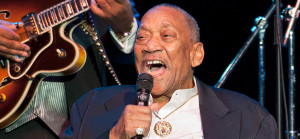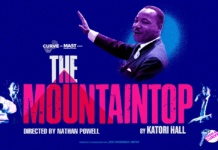One of the great Blues/Soul/RnB voices of the 20th Century fell silent on Sunday (June 23) when Bobby ‘Blue’ Bland passed away in Memphis.
Though he possessed gifts on a par with his most accomplished peers, Bobby Bland never achieved the popular acclaim enjoyed by contemporaries like Ray Charles and B. B. King. But he was nevertheless a mainstay on the rhythm-and-blues charts and club circuit for decades.
A prolific performer whose career began in 1947, Bland produced a formidable body of work, but anyone seeking a point of entry might start with his towering 1961 LP, Two Steps From the Blues. Like most full-lengths of its era, Two Steps From the Blues was actually a collection of Bland’s previously released singles for Houston’s Duke Records from the late 1950s and early 1960s, but the LP boasts such perfect sequencing and thematic cohesion that, taken in its entirety, it plays like a multi-tiered musical essay on love, lust and loss.
Bland’s signature mix of blues, jazz, pop, gospel and country music was a good decade in the making. His first recordings found him working in the lean, unvarnished style of B. B. King, even to the point of employing falsetto vocal leaps patterned after King’s. Bland’s mid-’50s singles were more accomplished; hits like “It’s My Life, Baby” and “Farther Up the Road” are now regarded as hard-blues classics, but they still featured the driving rhythms and stinging electric guitar favoured by King and others. It wasn’t until 1958’s “Little Boy Blue,” a record inspired by the homiletic delivery of the Rev. C. L. Franklin, that Bland arrived at his trademark vocal technique.
“That’s where I got my squall from,” Bland said, referring to the sermons of Mr. Franklin — “Aretha’s daddy,” as he called him — in a 1979 interview with the author Peter Guralnick. “After I had that I lost the high falsetto. I had to get some other kind of gimmick, you know, to be identified with.”
Bobby Bland has left a legacy of music to be savoured, cherished, and given renewed energy as living work. Whenever a voice as irreplaceable as Bland’s is lost, there are those who will take it as opportunity to rage at the tyranny of Autotune, TV talent show fodder and generally yell at the 21st century to get off their lawn. But the better and far more honest way to celebrate Bobby Bland is to purchase a copy of Two Steps From the Blues, put it on late some night and, as it washes over you, let yourself be reminded that all this was once new too.









